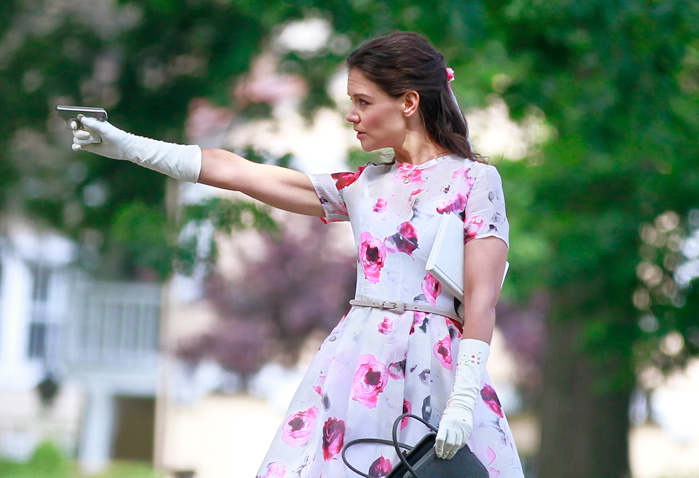
Moviegoers who are slaves to genre aren’t going to have much love for the legitimately out-of-control “Miss Meadows.” This whatsit begins with a prim and proper maiden talking to CGI squirrels and birds before firing a pistol into the throat of an obvious sex offender in the middle of a sunny suburban street. The victim isn’t sleazy enough to be funny, the violence is too glib to be serious, and there’s, overall, a jarring divide occurring here. Immediately, the knee-jerk reaction is to say this doesn’t work.
It doesn’t help matters that we find out our heroine has already been established offscreen as a bit of an odd duck. Miss Meadows (Katie Holmes) is already comfortably ensconced in this small town as a first grade substitute teacher, having uneasily bumped up against her neighbors and coworkers more than a few times before we’ve met. Her likes are tap dancing, flowers, and proper diction, and her dislikes are apparently the sort of easy-to-spot freaks you see committing crimes in movies moreso than real life. The vibe is John Waters, though Waters would likely make those convicts his leads.
Miss Meadows soon finds herself pursued by the besotted Sheriff (James Badge Dale). While Ms. Holmes is not without her striking doll’s eyes and cat’s smirk, he first notices her immaculate and unexplained 1950’s-era vehicle, as if he’s become attracted to a woman out of time. Later, they bond over what he perceives to be their shared oddness. During a picnic date, the camera begins to depart as Meadows dances on the grass for his amusement. Without motivation, the crane stops, holding on a bird’s-eye view of the Sheriff watching her for a few moments from the comfort of their blanket before he too rises and begins to soft shoe, the two of them improvising a dance at the edge of the frame. It has the looseness of an outtake, a charmingly askew courtship captured on film almost by accident.
The first film as a director from screenwriter Karen Leigh Hopkins, “Miss Meadows” is often slack and undisciplined, teasing out whether the Sheriff is going to find out whether he’s dating a murderer or not. The first half of the picture seems determined to be all things, a cocktail of “Mary Poppins” and “Ms. 45.” “Miss Meadows” gets its bearings when the title character has a sit-down with another criminal straight out of central casting, one who forces her to re-examine her approach. The idea of a criminal and a vigilante being on different sides of the same coin is a tired one, but Callen Mulvey brings considerable menace and depth to his deceptively wily molester. This is Pop Psychology 101, the sort of thing that fuels ten minutes of every episode of “Hannibal.” Here, it contributes to the film’s late arriving tension, even if the character work Mulvey does is quickly undone by a transition to straight-ahead monster.
“Miss Meadows” builds to a conclusion that seems apocalyptic as Meadows herself feels her world shrinking and her philosophies unable to keep her above water. That sense of doom, at moments, helps you avoid the fact that “Miss Meadows” seems to have no agenda beyond depicting a mannered young woman brandishing a gun and teaching proper manners. That very world, unfortunately, is never established as a living, breathing thing: Meadows has a neighbor played by a biting Mary Kay Place, who installs bars over her windows and spits venom behind Meadows’ back after she rejects an attempt to set her up on a date. And at school, Meadows’ cynical boss snipes at her to stop planting false hope in the children when another educator is stricken with cancer. The argument is that Miss Meadows is an anomaly in a very bad world, and her loosening grip on her own sanity suggests that its catching up to her. Maybe it would have been best to keep “These Boots Were Made For Walkin’” off the soundtrack, in that case. [C-]
Browse through all our coverage of the 2014 Tribeca Film Festival by clicking here.


